- Clone
- A17188A (See other available formats)
- Regulatory Status
- RUO
- Other Names
- PD1, PDCD1
- Isotype
- Mouse IgG2b, κ
- Ave. Rating
- Submit a Review
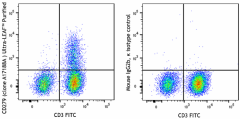
| Cat # | Size | Price | Quantity Check Availability | Save | ||
|---|---|---|---|---|---|---|
| 379203 | 100 µg | 110 CHF | ||||
| 379204 | 1 mg | 149 CHF | ||||
Programmed cell death protein 1 (PD-1), also known as CD279, is a 55 kD member of the immunoglobulin superfamily. CD279 contains the immunoreceptor tyrosine-based inhibitory motif (ITIM) in the cytoplasmic region and plays a key role in peripheral tolerance and autoimmune disease. CD279 is expressed predominantly on activated T cells, B cells, and myeloid cells. PD-L1 (B7-H1, CD274) and PD-L2 (B7-DC, CD273) are ligands of CD279 (PD-1) and are members of the B7 gene family. Evidence suggests overlapping functions for these two PD-1 ligands and their constitutive expression on some normal tissues and upregulation on activated antigen-presenting cells. Interaction of CD279 ligands results in inhibition of T cell proliferation and cytokine secretion.
Product DetailsProduct Details
- Verified Reactivity
- Human
- Antibody Type
- Monoclonal
- Host Species
- Mouse
- Immunogen
- Recombinant Human CD279 protein
- Formulation
- 0.2 µm filtered in phosphate-buffered solution, pH 7.2, containing no preservative.
- Endotoxin Level
- Less than 0.01 EU/µg of the protein (< 0.001 ng/µg of the protein) as determined by the LAL test.
- Preparation
- The Ultra-LEAF™ (Low Endotoxin, Azide-Free) antibody was purified by affinity chromatography.
- Concentration
- The antibody is bottled at the concentration indicated on the vial, typically between 2 mg/mL and 3 mg/mL. Older lots may have also been bottled at 1 mg/mL. To obtain lot-specific concentration and expiration, please enter the lot number in our Certificate of Analysis online tool.
- Storage & Handling
- The antibody solution should be stored undiluted between 2°C and 8°C. This Ultra-LEAF™ solution contains no preservative; handle under aseptic conditions.
- Application
-
FC - Quality tested
- Recommended Usage
-
Each lot of this antibody is quality control tested by immunofluorescent staining with flow cytometric analysis. For flow cytometric staining, the suggested use of this reagent is ≤ 0.5 µg per million cells in 100 µL volume. It is recommended that the reagent be titrated for optimal performance for each application.
- Application Notes
-
Clone A17188A antibody does not completely block the binding of clones NAT105, EH12.2H7, and A17188B to target cells.
- RRID
-
AB_2922604 (BioLegend Cat. No. 379203)
AB_2922604 (BioLegend Cat. No. 379204)
Antigen Details
- Structure
- 55 kD type I transmembrane protein
- Distribution
-
Transiently expressed on CD4- and CD8- thymocytes, upregulated in thymocytes and splenic T and B lymphocytes, and is expressed on activated myeloid cells.
- Function
- Signaling, co-stimulation (co-inhibition)
- Interaction
- SHP-1 and SHP-2
- Ligand/Receptor
- PD-L1 (CD274) and PD-L2 (CD273)
- Cell Type
- Lymphocytes, T cells
- Biology Area
- Adaptive Immunity, Cancer Biomarkers, Cell Biology, Immuno-Oncology, Immunology, Inhibitory Molecules
- Molecular Family
- CD Molecules, Immune Checkpoint Receptors
- Antigen References
-
- Ishida Y, et al. 1992. EMBO J. 11:3887
- Francisco LM, et al. 2010. Immunol Rev. 236:219
- Gene ID
- 5133 View all products for this Gene ID
- UniProt
- View information about CD279 on UniProt.org
Related FAQs
- Do you guarantee that your antibodies are totally pathogen free?
-
BioLegend does not test for pathogens in-house aside from the GoInVivo™ product line. However, upon request, this can be tested on a custom basis with an outside, independent laboratory.
- Does BioLegend test each Ultra-LEAF™ antibody by functional assay?
-
No, BioLegend does not test Ultra-LEAF™ antibodies by functional assays unless otherwise indicated. Due to the possible complexities and variations of uses of biofunctional antibodies in different assays and because of the large product portfolio, BioLegend does not currently perform functional assays as a routine QC for the antibodies. However, we do provide references in which the antibodies were used for functional assays and we do perform QC to verify the specificity and quality of the antibody based on our strict specification criteria.
- Does BioLegend test each Ultra-LEAF™ antibody for potential pathogens?
-
No, BioLegend does not test for pathogens in-house unless otherwise indicated. However, we can recommend an outside vendor to perform this testing as needed.
- Have you tested this Ultra-LEAF™ antibody for in vivo or in vitro applications?
-
We don't test our antibodies for in vivo or in vitro applications unless otherwise indicated. Depending on the product, the TDS may describe literature supporting usage of a particular product for bioassay. It may be best to further consult the literature to find clone specific information.
Other Formats
View All CD279 Reagents Request Custom Conjugation| Description | Clone | Applications |
|---|---|---|
| Ultra-LEAF™ Purified anti-human CD279 (PD-1) Antibody | A17188A | FC |
| FITC anti-human CD279 (PD-1) | A17188A | FC |
| APC anti-human CD279 (PD-1) | A17188A | FC |
| PE anti-human CD279 (PD-1) | A17188A | FC |
Compare Data Across All Formats
This data display is provided for general comparisons between formats.
Your actual data may vary due to variations in samples, target cells, instruments and their settings, staining conditions, and other factors.
If you need assistance with selecting the best format contact our expert technical support team.
-
Ultra-LEAF™ Purified anti-human CD279 (PD-1) Antibody

Human peripheral blood lymphocytes were stained with anti-hu... 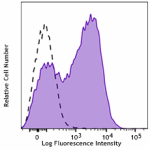
PHA stimulated (3 days) human peripheral blood lymphocytes w... -
FITC anti-human CD279 (PD-1)

Human peripheral blood lymphocytes were stained with anti-hu... 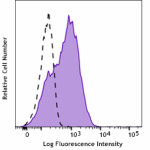
Peripheral blood mononuclear cells were stimulated with PHA ... -
APC anti-human CD279 (PD-1)

Human peripheral blood lymphocytes were stained with anti-hu... 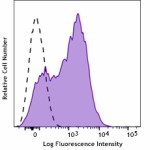
Peripheral blood mononuclear cells were stimulated with PHA ... -
PE anti-human CD279 (PD-1)

Human peripheral blood lymphocytes were stained with anti-hu... 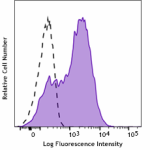
Peripheral blood mononuclear cells were stimulated with PHA ...

 Login / Register
Login / Register 















Follow Us